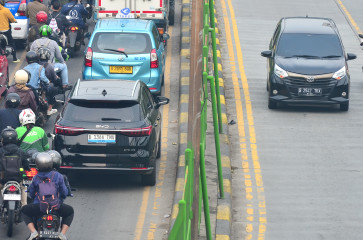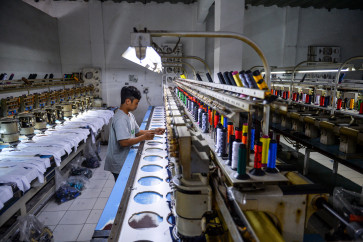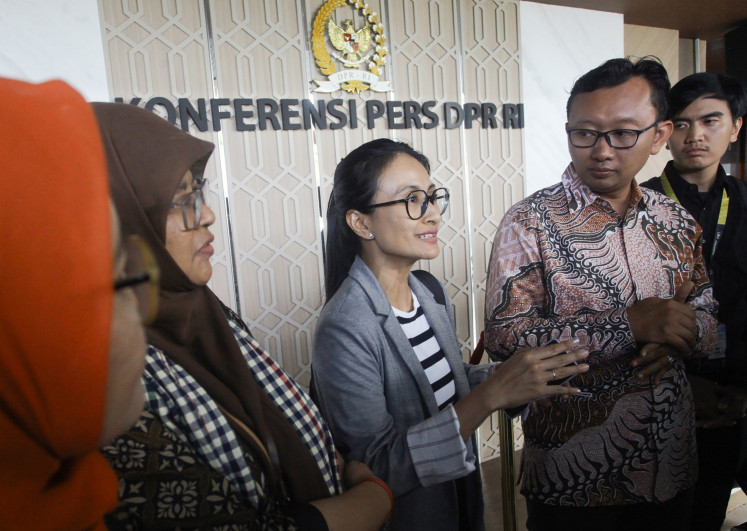Popular Reads
Top Results
Can't find what you're looking for?
View all search resultsPopular Reads
Top Results
Can't find what you're looking for?
View all search resultsGovt backtracks on land redistribution
Following pressure from the private sector, the government has backtracked on its new regulation that requires forestry companies to allocate at least 20 percent of their existing concession areas to local people
Change text size
Gift Premium Articles
to Anyone
F
ollowing pressure from the private sector, the government has backtracked on its new regulation that requires forestry companies to allocate at least 20 percent of their existing concession areas to local people.
According to the Environment and Forestry Ministry on Wednesday, the ministerial regulation only applies to new concession holders that have not gone into production.
'In regards to the 20 percent requirement, the Association of Indonesian Forest Concessionaires [APHI] asked [for the regulation to] not apply to areas that have gone into production as it would disturb their production,' the ministry's social and partnership forestry director general, Hadi Daryanto, said on Wednesday.
Therefore, only new concession holders are required to allocate 20 percent of their areas.
'So we don't affect production because production needs investment and investment needs labor. So we have to protect both [business people and indigenous people]. The government acts as a negotiating thread for the interests of multiple parties,' Hadi said.
He said that if the new regulation affected business people, then it would also affect investment in the forestry sector.
'Why would we want to disturb production? How could we hope people will invest in such a difficult situation?' said Hadi.
Last month, APHI executive director Purwadi Soeprihanto said the regulation would make their forestry business no longer economically viable because it would significantly squeeze their plantation areas.
For this reason, he said, the association had proposed to the government to impose the new regulation only on new concession areas, not on areas that have already been planted.
As many as 154 of the association's members are involved in the industrial forestry business, with a total of 7.45 million hectares of concession areas. They are mostly involved in timber, sago and rubber plantations.
APHI director on industrial timber plantations (HTI), Nana Suparna, said that the leeway was a relief for the industry.
'If the government forces [the regulation on all concession holders], then it would disturb existing working plans,' he told The Jakarta Post on Wednesday. 'Therefore, I agree very much [on the leeway] and it's so wise [for the government to do so].'
As for new concession holders, Nana said that it would not be a problem for them as long as they could afford to invest under the new regulation.
Even though the ministerial regulation has come into effect, Environment and Forestry Ministry planology director general San Afri Awang recently said that many companies had failed to abide by the regulation.
'Companies have not done that [allocating 20 percent of their concession areas]. I'm not afraid to say that based on data that I've seen, as well as on testimonies from some companies,' he said.
According to him, around 430,000 hectares of land has not been allocated to local people under the partnership scheme despite the fact that the government has given leeway to forest concessionaires.
The Indigenous People's Alliance of the Archipelago (AMAN) said that it was not relevant to the indigenous people's demand for the country to restore their rights to manage their customary forests, estimated to encompass 40 million hectares across the country.
AMAN secretary-general Abdon Nababan said that the government should have focused on restoring indigenous people's land rights by mediating conflicts between them and concession holders, instead of focusing on delivering a certain size of land.
'The 20 percent requirement is simplifying the land rights restoration process,' he told the Post.
While the government has accommodated business people's demands, Hadi said that it would not hinder the government's plan of redistributing 12.7 million hectares of social forests from 2015 to 2019 to deal with rampant land disputes involving indigenous communities.
'We still have 36.6 million hectares [that could potentially be turned into social forests for indigenous people],' he said.










